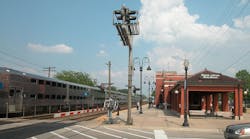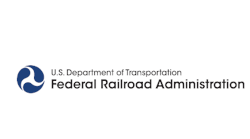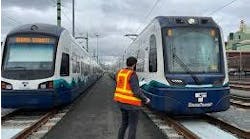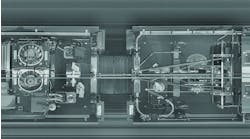FRA says PTC’s full implementation is ‘in sight,’ but NJ Transit remains at risk
Six weeks before a statutory deadline of Dec. 31, 2020, all but one railroad is on track to have Positive Train Control (PTC) fully implemented.
The Federal Railroad Administration (FRA) released the railroads’ self-reported progress for the third quarter of 2020 and as of Sept. 30, all railroads subject to the statutory mandate are currently operating PTC systems in revenue service or in advanced field testing, known as revenue service demonstration (RSD).
“Full implementation of PTC is in sight, owing to everyone’s unparalleled cooperation and determination,” said FRA Administrator Ronald L. Batory. “I’m incredibly proud of the intensive collaborations we have forged. Once complete, railroads, rail workers and rail passengers will all benefit from this transformational accomplishment in railroad safety.”
New Jersey Transit (NJ Transit) remains the lone railroad to keep the FRA’s “at risk” label based on criteria the administration uses to evaluate the risk of noncompliance.
According to FRA, NJ Transit’s Sept. 30 report states that the agency is operating a PTC system in RSD on approximately 48 percent of its 375.9 PTC-mandated route miles. Additionally, NJ Transit’s PTC system must be interoperable with seven other railroads – a technical feat that has slowed progress on several peers.
FRA explains it continues to direct additional resources and technical assistance to NJ Transit, including on-site support to oversee and expedite testing and RSD. FRA’s leadership and PTC specialists meet with the agency multiple times each month to provide advice regarding its schedule and the remaining actions NJ Transit must take to fully implement an FRA-certified and interoperable PTC system on the agency’s required main lines by the Dec. 31 deadline.
While FRA data is current through Sept. 30, NJ Transit has posted a progress report from its supplier, Parsons, on its website that was current as of Nov. 12. The report shows the remaining lines required to enter extended RSD will be complete by Dec. 7. Parsons and Alstom believe they are on target to have PTC 100 percent complete prior to Dec. 31.
Last week, the American Public Transportation Association (APTA) issued a statement saying 100 percent of the PTC milestones had been completed by the 28 commuter railroads.
“The commuter rail industry is poised to complete full implementation of positive train control by December 2020,” said APTA President and CEO Paul P. Skoutelas. “Riding commuter rail is 18 times safer than driving an auto, and as an industry, we are committed to being a leader in rider safety by implementing Positive Train Control. Our industry has devoted tremendous time and resources to ensuring the safety of riders through PTC implementation.”
NJ Transit’s commuter rail neighbors, Long Island Rail Road (LIRR) and Metro-North Railroad, are also nearing the finish line to implement the technology.
All Metro-North trains on the Harlem Line, Hudson Line and Danbury Branch are operating under PTC. On the New Haven Line and the New Haven Line’s New Canaan Branch, the railroad has completed testing the PTC software for the line’s M8 electric cars and is obtaining the safety certification that will allow M8 trains to enter PTC operations at the end of the month.
LIRR is now operating PTC on 98 percent of the railroad’s 305 route miles. The remaining segment to be implemented is at Harold Interlocking, which is a complex of switches in Sunnyside, Queens, where Amtrak and LIRR trains merge to reach New York Penn Station. All testing required for this location has been completed. The LIRR expects to implement PTC at this location as soon as Amtrak finalizes its PTC in the adjacent rail lines it controls.

Mischa Wanek-Libman | Group Editorial Director
Mischa Wanek-Libman is director of communications with Transdev North America. She has more than 20 years of experience working in the transportation industry covering construction projects, engineering challenges, transit and rail operations and best practices.
Wanek-Libman has held top editorial positions at freight rail and public transportation business-to-business publications including as editor-in-chief and editorial director of Mass Transit from 2018-2024. She has been recognized for editorial excellence through her individual work, as well as for collaborative content.
She is an active member of the American Public Transportation Association's Marketing and Communications Committee and served 14 years as a Board Observer on the National Railroad Construction and Maintenance Association (NRC) Board of Directors.
She is a graduate of Drake University in Des Moines, Iowa, where she earned a Bachelor of Arts degree in Journalism and Mass Communication.







